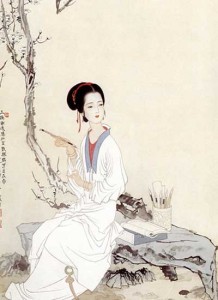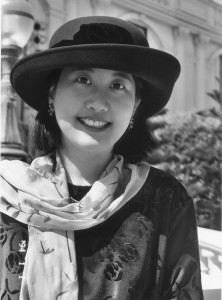(Li Qingzhao & Karen An-hwei Lee)
A coincidence. Seeking a rare vision of grace in the ash of war, exile, and a ruined economy, my eye fell upon a Song Dynasty woman poet’s writings via an ideogram shared by our last names: 李. As far as equivalencies between our languages, her last name and mine are one and the same.
Her full name: Li Qingzhao.
As a girl, I knew about the Tang Dynasty male poet Li Bai or Li Po, whose famous poem on moonlight I memorized and recited. I was new to a woman poet named Li. I found Li Qingzhao while perusing Dorothy Disse’s on-line archive, Other Women’s Voices: Translations of Women’s Writing before 1700. Romanized, Li Qingzhao’s beautiful surname is also spelled Ching-ch’ao.
For Anglophone tongues, the third syllable is close to “ts” in “tse-tse fly.”
Li adored her husband Zhao Mingcheng, who shared her literary interests. Li was perpetually in love with him. They collected art and played “poetry games.” After composing a line or identifying a quotation, the winner drank a cup of tea, which Li occasionally spilled on herself, laughing aloud. She took pleasure in book-collecting, observing chrysanthemums and pear blossoms, or sitting quietly with a burning censer after dusk.
Li wrote original poems set to the tune of popular songs called ci.
Lyrical and passionate, her work stands apart from Song Dynasty women who chose to write stylized verse framed by imperial culture. At once intimate and universal, Li voices a timeless reality: Love, memory, and loss are integral to human experience. Indeed, her life of writing and art-collecting was doomed by the political instabilities of her time. After the fall of the Northern Song Dynasty, she and Zhao fled into exile as their possessions were reduced to ash.
My desire is for Li’s voice to sing in these translations.
She recalls a youthful boating excursion with joy, observes a courtyard plantain tree flourish in her southern exile, listens to rain on the leaves of a parasol tree, watches for the first signs of yellow chrysanthemums, or alludes to her late husband with tender regret while her own hair silvers at the temples. In this trio, her solitude is quite transparent in a reference to the mythic peng bird who soars on wind over water for ninety thousand li.
Certainly, I am not the first translator of Li’s work, nor the last.
My deep respect goes to the historians Beata Grant, Wilt Idema, Kang-I Chang, and Haun Saussy, who translated and anthologized many of Li’s writings, circulating them in the West. Arthur Sze eloquently translated a number of Li’s poems. Heartfelt thanks to Lucy Chao, Lu-sheng Chong, and Dorothy Disse for their digital treasuries of Li’s poetry in the 21st Century.
—Karen An-hwei Lee
漁家傲
by Li Qingzhao
天接雲濤連曉霧,
星河欲轉千帆舞﹔
彷佛夢魂歸帝所,
聞天語,
殷勤問我歸何處。
我報路長嗟日暮,
學詩漫有驚人句﹔
九萬里風鵬正舉,
風休住,
蓬舟吹取三山去。
To the Tune of Yu Jia Ao: The lofty fisherman
by Li Qingzhao
When the sky, mist, and waved clouds mingle at dawn,
when a star-laden river, the Milky Way, wheels
in the dance of a thousand sails,
then my spirit, in a dream, drifts to the empyrean,
listening to heaven’s voice
gently asking me about a journey:
What is your desire?
I answer with a sigh: The road is long at dusk;
I’ve studied poetry intently,
even written a few startling lines.
Yet the powerful peng bird
soars high for ninety thousand li
on pure wind, unceasing wind,
as I desire to send my little boat
three mythic mountains away.
translated from Chinese by Karen An-hwei Lee
more>>
漁家傲
by Li Qingzhao天接雲濤連曉霧,
星河欲轉千帆舞﹔
彷佛夢魂歸帝所,
聞天語,
殷勤問我歸何處。
我報路長嗟日暮,
學詩漫有驚人句﹔
九萬里風鵬正舉,
風休住,
蓬舟吹取三山去。
To the Tune of Yu Jia Ao: The lofty fisherman
by Li QingzhaoWhen the sky, mist, and waved clouds mingle at dawn,
when a star-laden river, the Milky Way, wheels
in the dance of a thousand sails,
then my spirit, in a dream, drifts to the empyrean,
listening to heaven’s voice
gently asking me about a journey:
What is your desire?
I answer with a sigh: The road is long at dusk;
I’ve studied poetry intently,
even written a few startling lines.
Yet the powerful peng bird
soars high for ninety thousand li
on pure wind, unceasing wind,
as I desire to send my little boat
three mythic mountains away.
translated from Chinese by Karen An-hwei Lee
